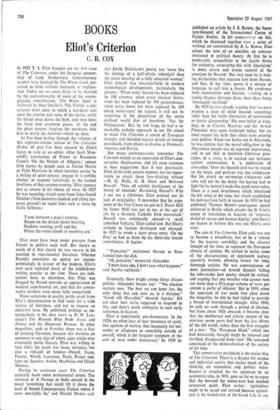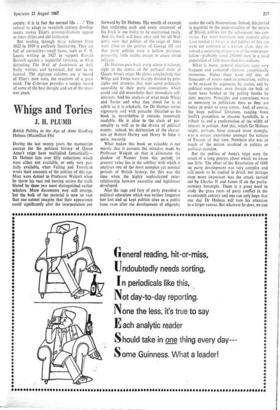Eliot's Criterion BOOKS
C. B. COX
In 1922 T. S. Eliot brought out the first issue of The Criterion, under the financial sponsor- ship of Lady Rothermere. Contemporary readers were shocked by The Waste Land, pre- sented to them without comment or explana- tion. Today we are more likely to be shocked by the conventionality of some of the accom- panying contributions. The Waste Land is followed by May Sinclair's 'The Victim,' a sen- sational short story in which a murderer cuts open the arteries and veins of his victim, swills the blood away down the bath, and then hews the body into seventeen pieces. At the end the ghost returns, forgives the murderer, tells him to marry his beloved—which he does.
As I've been leafing through the volumes of this eighteen-volume reissue of The Criterion (Faber 60 gns) I've been amazed by Eliot's lapses in taste as an editor. After Scott Mon- crieffs translations of Proust or Benedetto Croce's 'On the Nature of Allegory,' appear little stories by people such as Feiron Morris or Felix Morrison in which heroines awake `to a feeling of quiet ecstasy,' engage in 'a teriible silence,' or respond 'sensitively to the hushed loveliness of that autumn evening.' Eliot appears just as unsure in his choice of verse. In 1927 he was accepting turgid verse from John Gould Fletcher (Iron hammers clanked and tilting fur- naces poured') or vapid lines such as these by Stella Gibbons: 'I saw, between a page's turning, Shapes on the distant desert burning, Shadows running, swift and far, Where the white clouds of morning are.'
Eliot must have been under pressure from friends to publish such stuff. But there's so much of it that clearly he was unsure in his reaction to experimental literature. Whereas Pound's comments on poetry are uncom- promisingly in favour of the modern, Eliot's own taste included much of the middlebrow writing popular at the time. There are indi- cations here, as elsewhere, that Eliot was dragged by Pound towards an appreciation of modern experimental art, and that his conser- vative instincts were never fully vanquished.
These variations in quality partly result from Eliot's determination to find room for a wide variety of literature, and not to impose an exclusive taste. He published writings as un- sympathetic to his own views as D. H. Law- rence's The Woman Who Rode Away and Jimmy and the Desperate Woman. In other magazines, such as Scrutiny, there was a fear of printing literature, because this involves an openness to any sign of talent, signs which may eventually prove illusory. Eliot was willing to take risks; the result was many mistakes, but also a roll-call of honour—Pound, Joyce, Forster, Woolf, Lawrence, Yeats, Proust and, later on, Spender, Auden, MacNeice and Dylan Thomas.
During its seventeen years The Criterion naturally made some monumental errors. The reviewer of A Passage to India missed in the novel 'something that could lift it above the level of Sound Contemporary Fiction where it must inevitably lie,' and Harold Moore said that Emily Dickinson's poetry was 'more like the jottings of a half-idiotic schoolgirl than the grave musings of a fully educated woman.' Eliot himself was unsympathetic to modern technological developments, particularly the cinema : 'When every theatre has been replaced by 100 cinemas, when every musical instru- ment has been replaced by 100 gramophones, when every horse has been replaced by 100 cheap motor-cars,' he argued, it will not be surprising if the population of the entire civilised world dies of boredom, 'like the Melanesians.' But, by and large, he had a re- markably catholic approach to art. He aimed to make The Criterion a centre of European thought, and included regular details of foreign periodicals, from places as diverse as Denmark, America and Russia.
But many contemporaries remember The Criterion mainly as an expression of Eliot's con- servative Anglicanism, and it's even common to hear suggestions that it was pro-fascist. Eliot, in his cold, precise manner, lost no oppor- tunity to attack those free-thinking villains —H. G. Wells, G. B. Shaw and Bertrand Russell : 'They all exhibit intelligence at the mercy of emotion.' Reviewing Russell's Why I am not a Christian. Eliot pointed out its lack of originality: 'I remember that his argu- ment of the First Cause (as put to J. Stuart Mill by James Mill) was put to me, at the age of six, by a devoutly Catholic Irish nursemaid.' Russell was continually abused—`a small suburban Voltaire,' Eliot called him. But Eliot's attitude to fascism developed and changed. In 1925 he wrote a short prose story, 'On the Eve,' as bad as those by his third-rate female contributors. It begins:
"Pancakes!" exclaimed Horace as Rose handed him the dish.
"Ah, pancakes," mumured Alexander.
"I must have one, I don't care what happens," said Agatha recklessly.'
Eventually these bright young things discuss politics. Alexander breaks out: "No election matters now. The best we can hope for, the only thing that can save us, is a dictator." "Good old Mussolini," shouted Agatha.' It's not clear how we're supposed to respond to this, and there's much ambiguity in such early references to fascism.
Eliot is consistently anti-democratic. In the 1920s we often hear of that 'meanness of spirit, that egotism of motive, that incapacity for sur- render or allegiance to something outside of oneself, which is the frequent symptom of the soul of man under democracy.' In 1929 he
published an article by J. S. Barnes, the Secre- tary-General of the International Centre of Fascist Studies. In his commentary on this, which he discussed together witn a series of writings on communism by A. L Rowse, Eliot adopts the tone of an outsider, an antateur interested in political theory. At first he is moderately sympathetic to the fascist desire for authority, associating this with 'classicism,' 'a more severe and serene control of the emotions by Reason.' But very soon he is mak- ing distinctions that separate him from Barnes, and that, in my view, prove it a misuse of language to call him a fascist. He condemns both communism and fascism, iisisting on a family likeness between them, their ideas being 'thoroughly sterilised.'
By 1929 he was already arguing that 'we must prepare a state of mind towards something other than the facile alternative of communist or fascist dictatorship.' His own belief in king- ship, or in Charles Maurras and the Action Francaise, may seem irrelevant today; but we must respect his faith that ethics have priority over politics. When war broke out in Abyssinia, he was certain that the moral obligation to the Abyssinian people was of supreme importance, and to say that to maintain Christian prin- ciples, in a crisis, is to weaken our defences against communism, is 'a confession of cowardice.' Over the Spanish civil war he stayed on the fence, and perhaps was too withdrawn. But his attack on extremism ('whatever side wins will not be the better for having had to fight for its victory') reads like good sense today. There is a cool detachment which infuriated the left wing at the time, but which established his non-partisan faith in reason. In 1931 he had published Thomas Mann's courageous speech delivered in Berlin which attacks the St Vitus's dance of fanaticism in fascism, its 'orgiastic denial of reason and human dignity,' and there's no reason to believe this was not Eliot's own view.
The aim of The Criterion, Eliot said, was not to become a miscellany, but to be a vehicle for the keenest sensibility and the clearest thought of the time, to represent the European climate of opinion. He wished to revive some of the characteristics of nineteenth century quarterly reviews, allowing leisure for long, thorough articles. He was contemptuous of most journalism—of. Arnold Bennett 'telling the tube-reader how poetry should be written, and arguing that any versifier who cannot turn out more than a fifty-page volume of verse per annum is guilty of idleness.' But in 1939, when the approach of war made him close down the magazine, he felt he had failed to provide a forum of international thought. After 1918, he said, we went through a period of illusion, but from about 1926 onwards it became clear that the intellectual and artistic output of the previous seven years had been the last efforts of the old world, rather than the first struggles of a new: 'The "European Mind," which one had mistakenly thought might be renewed and fortified, disappeared from view.' He remained convinced of the demoralisation of the society of his time.
This conservative pessimism is the major bias of The Criterion. There is a disgust for science and industrial society that makes much of the thinking on economics and politics naive. Keynes is attacked for his optimism by an economist who, in 1931, goes so far as to argue that the demand for motor-cars had _reached saturation point: Eliot writes: 'agriculture ought to be saved and revived because agricul- ture is the foundation of the Good Life in any
society; it is in fact the normal life . . .' This refusal to adapt to twentieth century develop- ments makes Eliot's cosmopolitanism appear at times elitist and old-fashioned.
But reading through these volumes from 1922 to 1939 is endlessly fascinating. They are full of curiosities—small items, such as F. R. Leavis writing in 1927 to support Ronald Bottrall against a neglectful reviewer, or Eliot defending The Well of Loneliness as dull, badly written, and hysterical, but not to be banned. The eighteen volumes are a record of Eliot's own taste, the reactions of a great mind. The Criterion provides a unique record of some of the best thought and art of the inter- war years.































 Previous page
Previous page